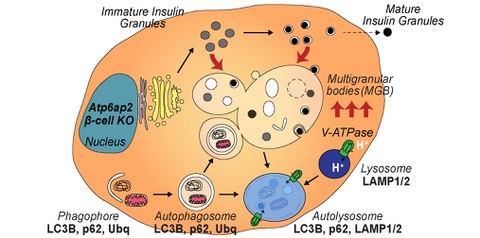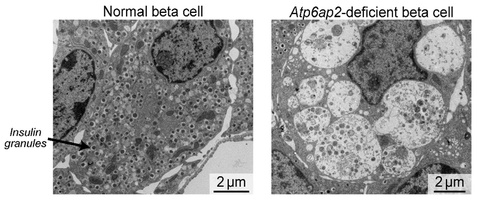Sep 17, 2019
International research team identified new important player in insulin homeostasis
Dresden and Victoria, September 17th, 2019
Researchers from La Trobe University in Australia and the Paul Langerhans Institute Dresden, partner in the German Center for Diabetes Research (DZD e.V.), in Germany have identified that the protein Atp6ap2 is essential for the correct functioning of pancreatic beta cells. When this protein was switched off in the beta cells of mice their blood glucose levels dramatically increased. The results of this international research project, to which the Max Delbrück Center for Molecular Medicine in Berlin also contributed, have now been published in the renowned journal “Proceedings of the National Academy of Sciences of the United States of America (PNAS)”
One in eleven adults worldwide suffer from diabetes and the number of diabetes patients is rising rapidly. People with type-1 diabetes lack insulin, the hormone that regulates blood glucose. Insulin is produced by specialised cells in the pancreas known as beta cells. When these cells lose their function or are mistakenly destroyed, the body loses its ability to make insulin leading to diabetes and to patient’s life-long requirement for insulin injections.
Researchers from La Trobe University in Australia and the Paul Langerhans Institute Dresden (PLID) have identified that a protein called Atp6ap2 is essential for the correct functioning of beta cells. “When we switched off this protein in the beta cells of mice their blood glucose levels dramatically increased”, explains Dr. Katrina Binger, lecturer in the department of Biochemistry and Genetics at La Trobe University and first author of the study. “On closer inspection, we found this was because Atp6ap2-deficient beta cells had become swollen with large bubbles or ‘vesicles’, which led to a loss of insulin in these cells and the onset of type 1 diabetes.”
To uncover the reason for the abnormal bubble formation the scientists used innovative imaging techniques to characterise their origin and measure their acidity. “Although Atp6ap2 was initially characterized as a subunit of the proton pump, which generates the acidification, we could not detect any impairment of acidification upon Atp6ap2 deletion” adds Martin Neukam, the second first author and postdoc in the Solimena lab of the PLID. This analysis showed that removal of Atp6ap2 lead to a constipation in junk-removal processes, suggesting that Atp6ap2 is required for the transport of vesicles and/or insulin-containing granules within beta cells –its absence causing in the accumulation and abnormal growth of the bubbles. “Based on these findings, we are now curious to investigate what molecules Atp6ap2 interacts within beta cells, as this may give further insight into the causes of beta cell failure and diabetes”, says Prof. Dr. Andreas Birkenfeld, senior author of the study from the University Study Center of Metabolic Disease at the University Hospital Dresden and research group leader at the Paul Langerhans Institute Dresden of Helmholtz Zentrum München at the University Hospital and Faculty of Medicine Carl Gustav Carus of TU Dresden.
Atp6ap2 is also known as the (pro)renin receptor and was only a few years ago the focus of cardiovascular research as it was proposed to be a drug target for high blood pressure. However, in the meantime, it has become clear that Atp6ap2 is essential for the proper functioning of many different cell types. Commenting on the findings, Dr. Binger concludes: “Our study contributes to a growing body of evidence that Atp6ap2 is important for the correct functioning of our cells. Here we show that without this protein, beta cells fail, resulting in the onset of type-1 diabetes. It is simply too dangerous to block it.”
Original publication:
Binger KJ, Neukam M, Tattikota SG, Qadri F, Puchkov D, Willmes DM, Wurmsee S, Geisberger S, Dechend R, Raile K, Kurth T, Nguyen G, Poy MN, Solimena M, Muller DM, Birkenfeld AL. Atp6ap2 deletion causes extensive vacuolation that consumes the insulin content of pancreatic β-cells
Link: https://www.pnas.org/content/early/2019/09/12/1903678116
Contacts:
Dr. Katrina Binger
Department of Biochemistry and Genetics
La Trobe Institute for Molecular Sciences (LIMS)
La Trobe University, Bundoora, Victoria 3086, Australia
Phone: +61 3 9479 1350
E-mail: k.binger@latrobe.edu.au
Internet: https://scholars.latrobe.edu.au/display/kbinger
Prof. Andreas Birkenfeld
University Study Center of Metabolic Diseases, Medical Clinic III, Medical Faculty of the TU Dresden, University Hospital Carl Gustav Carus Dresden
Paul Langerhans Institute Dresden at the Helmholtz Zentrum München and the University Hospital and Medical Faculty Carl Gustav Carus at TU Dresden
Fetscherstraße 74
01307 Dresden
Germany
Phone: +49(0)351 458 3651
Fax: +49 (0)351 458 3652
e-mail: andreas.birkenfeld@uniklinikum-dresden.de
Internet: https://tu-dresden.de/med/mf/plid/forschung/Birkenfeld


